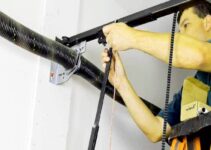Garage door openers, the unsung heroes of our daily routines, quietly perform their duties until one day, they don’t. Understanding the lifespan of these devices is crucial for homeowners to avoid unexpected malfunctions. Let’s delve into the mysteries of garage door opener longevity.
Average Lifespan of Garage Door Openers
On average, garage door openers persist for a span of 10 to 15 years. This timeframe, however, is subject to various factors that can either extend or curtail their operational life.
Factors Affecting Garage Door Opener Lifespan
- Quality and Brand Impact: Not all openers are created equal. Higher-quality brands and models generally outlast their budget-friendly counterparts. Investing in a reputable brand can be a wise long-term decision.
- Maintenance Matters: Regular care is the key to an extended lifespan. Simple practices like lubricating moving parts and inspecting chains, belts, and gears can significantly contribute to the durability of the garage door opener.
- Frequency of Use: Common sense prevails here; the more frequently you use the opener, the faster it wears out. Those who rarely operate their garage doors may find their openers enduring well beyond the average lifespan.
- Climate Conditions: Extreme weather, whether it’s scorching heat or freezing cold, can stress the opener mechanism. A garage door opener in a temperate climate may last longer than one battling the elements regularly.
- Proper Installation and Balancing: An unbalanced garage door can spell trouble for the opener. Ensuring the door is correctly installed and balanced minimizes strain on the opener, contributing to a longer life.
Additional Considerations
- Opener Types and Durability: Screw-drive openers often boast superior durability, making them a top choice. However, belt-drive openers, while quieter, might not match the longevity of their screw-drive counterparts.
- Safety Features for Prolonged Life: Newer openers come equipped with advanced safety features, including automatic reversal. These features not only enhance safety but also contribute to prolonging the opener’s life.
Signs Indicating Opener Wear and Tear
How do you know if your garage door opener is on its last legs? Watch out for these signs:
- Noisy Operation: Unusual sounds during operation can indicate internal wear and tear.
- Slow Opening or Closing: A sluggish performance may signify impending issues.
- Jerky or Uneven Movement: Smooth operation is a sign of a healthy opener; jerky movements suggest problems.
- Frequent Repairs: If you find yourself calling for repairs more often, it might be time for a replacement.
- Safety Features Malfunctioning: Any issues with safety features should be addressed promptly.
- Visible Wear and Tear: Physically inspecting the gears, chain, or belt can reveal signs of aging.
Consulting a Technician
Experiencing any of these issues? It’s advisable to consult a qualified technician. Their expertise can determine whether a repair suffices or if it’s time to invest in a new opener.
Maintenance Tips
To maximize the lifespan of your garage door opener, follow the manufacturer’s instructions diligently. Pay attention to any warning signs, and address them promptly to avoid premature failure.
Conclusion
In the grand scheme of home maintenance, the garage door opener plays a pivotal role. Understanding its lifespan and taking proactive measures can save homeowners from unexpected inconveniences. Regular maintenance, quality installations, and awareness of warning signs are the keys to a long and reliable opener life.


